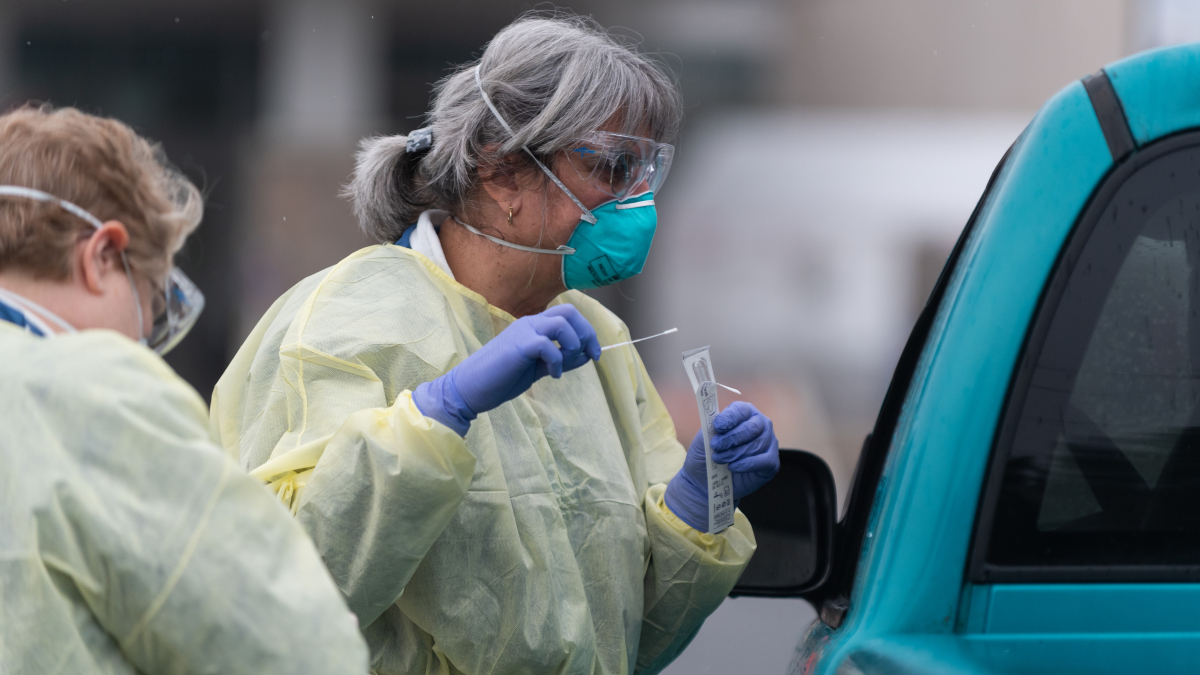You've Got the 'Rona But You Fail the Test

Coronavirus testing may have a false negative rate as high as 30 percent. Photo: Penn State Health.
What will happen to all the people who catch the coronavirus but never get a positive test? As states gear up to send workers back to work, the number of infections will skyrocket. We are going to need a whole new layer of protection for workers who are scarred by this virus but who cannot document its presence in their bodies.
The state of the U.S. response to COVID-19—with its lack of testing and questionable test accuracy—has meant that many infected people were denied tests because they were simply unavailable. I was among those, and because my fever was brief, I did not go to the ER due to breathing difficulties until I was in my fifth week of symptoms. While both the ER doctor and my primary care doctor, whom I’d consulted via telehealth and an online portal, assumed that I was struggling with COVID-19 and treated me as such, a nasal swab test came back negative.
That was expected. Many with COVID-19 symptoms, possibly 30 percent, receive false negatives. The test seems less useful for people whose illness has progressed beyond the first stages.
Thankfully, a lung x-ray was clear, but seven weeks out, pain in my lungs persists. I ordered an oxygen saturation monitor a month ago that hasn’t yet arrived, so I have no way to document my struggles processing oxygen. I worry now that I, who used to walk an easy two miles a day with my dog, can’t even walk to the corner without having a two-day “hangover” where the chills and weakness come back.
I also took an antibody test, ordered by an endocrinologist, who cautioned me that the tests were unreliable but said it sounded like, with my sense of lung constriction and other symptoms, that I must be struggling with COVID. The antibody test, too, was negative. What that means is also unclear.
NO DOCUMENTATION
I have no documentation of a COVID-19 infection. I have only how I feel, an experience backed up by thousands of people forming support groups such as the Body Politic group.
I’m a college professor, and my schedule is flexible. I don’t have to teach until the fall. And even so, I worry because a half-hour Zoom or phone call exhausts me so that I need a nap and a day to recover. I have a job that isn’t even physically demanding, and yet the physical act of projecting my voice to be picked up by a computer microphone is taxing.

SUPPORT LABOR NOTES
BECOME A MONTHLY DONOR
Give $10 a month or more and get our "Fight the Boss, Build the Union" T-shirt.
I worry about my future. If this is a long-lasting disability, how might I document it and prove it?
But what I really worry about are the millions of people who will get this devastating infection and who will be forced back to work before they are ready. It seems to many of us struggling with recovery that there is a “post-exertion malaise” that comes with a kickback. One can actually put oneself in peril by pushing too hard.
I worry about the millions of people who will be told that they’ve used up their sick time, who will be forced back to work in jobs more physical than mine, and whose bodies will continue to be ravaged by the mysterious workings of a disease that we don’t yet understand.
I worry about the people who will be fired for malingering, asked by their bosses or Human Resources to provide proof of their condition. Like me, they will scan their medical files and find “COVID-19” nowhere.
I worry about the early deaths that will result, and that will not be attributed to COVID-19.
Unless we do something to protect workers who “fail” their coronavirus test, they will fall into a netherworld whose boundaries are set by the limitations of our understanding of this virus.
Sonya Huber teaches English at Fairfield University in Connecticut and is a member of the American Association of University Professors.





